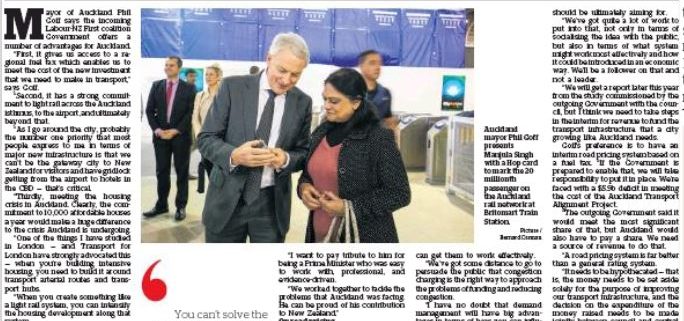Infrastructure: A chat with Auckland Mayor Phil Goff (NZ Herald)
Mayor of Auckland Phil Goff says the incoming Labour-NZ First coalition Government offers a number of advantages for Auckland.
“First, it gives us access to a regional fuel tax which enables us to meet the cost of the new investment that we need to make in transport.
“Secondly, it has a strong commitment to light rail across the Auckland isthmus, to the airport, and ultimately beyond that. As I go around the city, probably the number one priority that most people express to me in terms of major new infrastructure is that we can’t be the gateway city to New Zealand for visitors and have gridlock getting from the airport to hotels in the CBD – that’s critical.
“Thirdly, meeting the housing crisis in Auckland. Clearly, the commitment to 10,000 affordable houses a year would make a huge difference to the crisis that Auckland is undergoing.
“One of the things I have studied in London – and Transport for London have strongly advocated this – when you’re building intensive housing, you need to build it around transport arterial routes and transport hubs.
“When you create something like a light rail system, you can intensify the housing development along that system. There will be value uplift from the construction of that infrastructure, but most importantly houses are built so people can get from where they live to where they work quickly and efficiently.
“You can’t solve the transport problem and the housing problem in isolation. You must do it through projects that meet the needs of both.
“I had a very good working relationship with Bill English. I want to pay tribute to him for being a Prime Minister who was easy to work with, professional, and evidence driven. We worked together to tackle the problems that Auckland was facing. He can be proud of his contribution to New Zealand.”
On Road Pricing
Goff says the Singapore system will be the most advanced congestion charging system there is. But it has been very complex and expensive to implement.
“My view has always been – particularly when you’re using high tech applications – you should buy off the shelf and not necessarily lead them, because there will be a lot of challenges that need to be met and problems to be ironed out before you can get them to work effectively.
“We’ve got some distance to go to persuade the public that congestion charging is the right way to approach the problem of both funding and reducing congestion. I have no doubt that demand management will have big advantages in terms of how you can influence commuter behaviour.
“I’ve been in discussions with Transport for London, who say that the congestion charging in London has worked beyond all expectations. It raises about £150m per year – but more importantly than that – it has stabilised the level of vehicles coming into the city and reduced congestion. Having demand management as a form of road pricing is what we should be ultimately aiming for.
“We’ve got quite a lot of work to put into that, not only in terms of socialising the idea with the public, but also in terms of what system might work most effectively and how it could be introduced in an economic way. We’ll be a follower on that and not a leader. We will get a report later this year from the study commissioned by the outgoing government with the council, but I think we need to take steps in the interim for revenue to fund the transport infrastructure that a city growing like Auckland needs.
“My preference is to have an interim road pricing system based on a fuel tax. If the government is prepared to enable that, we will take responsibility to put it in place. We’re faced with a $5.9b deficit in meeting the cost of the Auckland Transport Alignment Project. The outgoing government said it would meet the most significant share of that, but Auckland would also have to pay a share. We need a source of revenue to do that.
“A road pricing system is far better than a general rating system. It needs to be hypothecated – that is the money needs to be set aside solely for the purpose of improving our transport infrastructure, and the decision on the expenditure of the money raised needs to be made jointly between council and central government.
“For the immediate future, having a fuel tax makes a lot of sense. While we are working through the process of what might be the most effective form of demand management or congestion charging, the regional fuel tax would enable us to get on and implement some of the infrastructure that we need for Auckland to avoid worsening congestion and gridlock closing the city down.”




Leave a Reply
Want to join the discussion?Feel free to contribute!